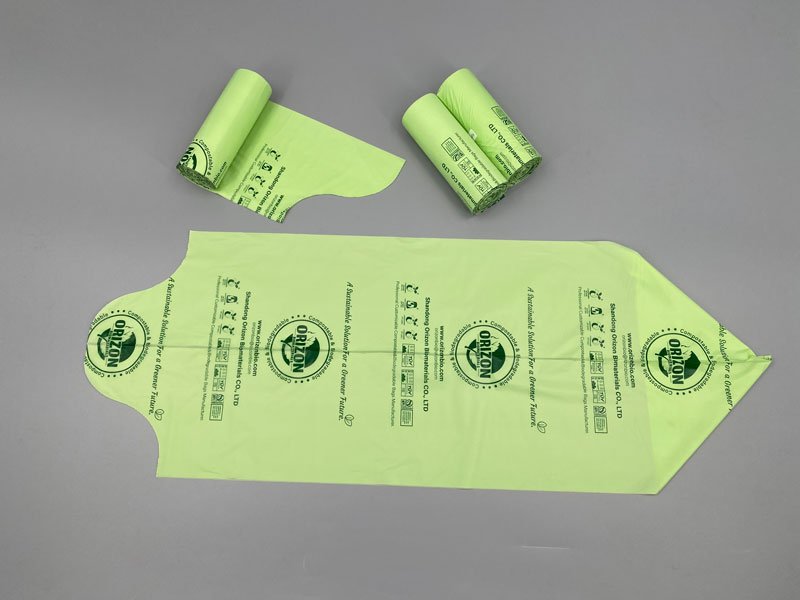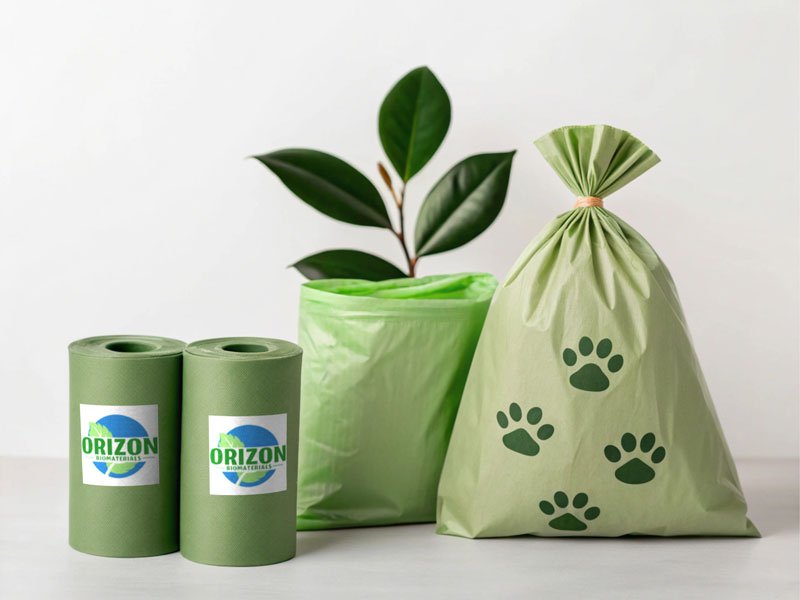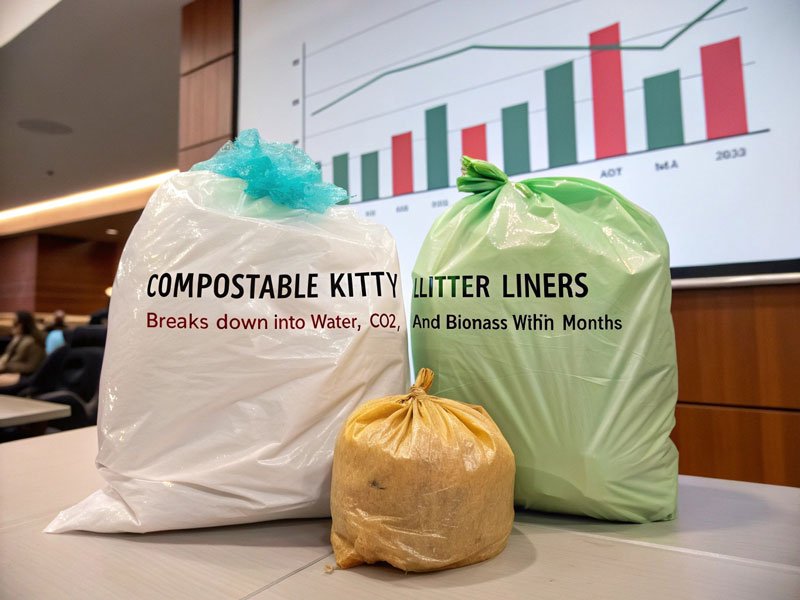As the global plastic pollution problem becomes increasingly serious, eco friendly bin bags are becoming a popular choice for families and businesses to practice sustainable living. Hundreds of millions of tons of plastic waste flow into oceans and landfills every year, and ordinary plastic bags may take hundreds of years to decompose. In contrast, eco friendly green trash bags, with their low carbon footprint and degradable properties, provide a practical solution to reduce the environmental burden.
But facing the dazzling array of sustainable trash bags on the market, are you confused: Are eco friendly bin bags really environmentally friendly? How to choose the right product for you?
This article will take you to a comprehensive understanding of the types of environmentally friendly trash bags, selection tips and common misunderstandings, to help you easily move towards a zero-waste life!
 Standard Garbage Bag
Standard Garbage Bag
What Are Eco Friendly Trash Bags?
Eco friendly trash bags(Eco friendly bin bags), also known as biodegradable trash bags or compostable garbage bags, are trash bags made of materials with less environmental impact, designed to replace traditional plastic bags. Unlike ordinary plastic bags, these sustainable bags are usually made of bio-based materials such as corn starch, PLA (polylactic acid) or PBAT, or use recycled plastic (recycled PET) to reduce the production of new plastic. Their decomposition time ranges from a few months to a few years, which is much shorter than the hundreds of years of ordinary plastic bags.
According to international certifications such as EN 13432 or USDA Biobased, true eco-conscious bags must meet specific conditions, such as 90% decomposition into water and carbon dioxide in an industrial composting environment, and no harmful residues are left. This is in stark contrast to greenwashing bags that claim to be "environmentally friendly" but have limited actual effects. When choosing, look for BPI certified bags or the OK Compost logo to ensure that you are buying genuine earth-friendly bags.
The following is a comparison between ordinary plastic bags and environmentally friendly garbage bags:
 types of eco friendly trash bags
types of eco friendly trash bags
Types of Eco Friendly Trash Bags
| Criteria | Degradable Trash Bags | Compostable Trash Bags | Recycled Plastic Bags | Alternative Fiber Bags |
|---|---|---|---|---|
| Material | PBAT/PLA blends Oxo-degradable |
Cornstarch/Plant-based Certified compostable |
Recycled PET/HDPERecyclable bags |
Jute/Hemp (jute bags, hemp bags) |
| Key Advantage | Faster decomposition | Fully converts to fertilizer | Reduces virgin plastic use | 100% natural & reusable |
| Main Limitation | Needs specific microbes/heat | Higher cost & lower strength | Not biodegradable | Poor moisture resistance |
| Ideal Scenario | Eco friendly grocery bags |
Compostable kitchen bags |
Commercial eco carry bags |
Decorative zero-waste solutions |
| Environmental Label | ❌ Not always plastic-free bags |
✅ Certified compostable | ♻ Circular economy bags |
🌱 Low-impact bags |
 What Are Plant Based Dog Poop Bags
What Are Plant Based Dog Poop Bags
How to Choose Suitable Eco Friendly Garbage Bags?
Identify the purpose:
- Household: kitchen garbage needs compostable bags to handle wet garbage, and living rooms or bedrooms can use lightweight biodegradable garbage bags.
- Commercial: The catering industry needs high-strength green trash bags, such as 30L-100L eco-friendly packaging; office scenes can choose recycled plastic bags to save costs.
For example, although reusable produce bags are not directly used for garbage, they can reduce the use of plastic in the kitchen and indirectly support the concept of minimalist bags.
Check certification:
Look for EN 13432 certified or BPI certified bags to avoid falling into the greenwashing trap. Some products on the market claim to be "eco" but actually only add a small amount of biomaterials.
USDA biobased certification indicates that the product contains a certain proportion of bio-based bag ingredients, which is more credible.
Pay attention to specifications:
- Capacity: 10L-30L is common for home use, and more than 50L may be required for commercial use.
- Thickness: Bags with a thickness of 0.8-1.2 mm can balance strength and environmental protection.
- Odor control: Kitchen bags need to be well sealed to prevent the spread of odor, especially suitable for vegan bag users to handle organic waste.
Budget considerations:
Compostable bags are more expensive, but have significant long-term environmental benefits.
Recyclable bags are cost-effective and suitable for cheap eco friendly bags.
Buying in wholesale (eco bags wholesale) or custom (custom eco friendly bags) can further reduce costs.
Purchase channels:
- Online: Amazon and Alibaba International Station offer a variety of options, suitable for bulk purchases of eco friendly bags.
- Offline: Supermarkets or local suppliers are more convenient for checking the actual products, suitable for small-volume purchases.
Search "eco friendly bags near me" to find local sustainable brands.
 compostable kitty litter bags
compostable kitty litter bags
The Actual Effects and Misunderstandings of Environmentally Friendly Garbage Bags
-
Data support: Studies have shown that biodegradable bags can reduce 80% of plastic residues under ideal conditions, while compostable garbage bags can convert organic waste into fertilizer and reduce landfill pressure.
-
Policy support: Global plastic bans (such as the EU's 2021 single-use plastic ban and China's 2020 plastic ban) have promoted the popularity of green packaging solutions, and eco-friendly trash bags have become the first choice for compliance.
Common misunderstandings
Myth: All eco-friendly trash bags can decompose quickly
Truth: Oxo-degradable bags require a specific environment (such as high temperature or ultraviolet rays), otherwise the decomposition rate may not be ideal. Choosing compostable bags is more suitable for home composting.
Myth: Eco-friendly garbage bags are expensive
Truth: Recycled plastic bags are close to traditional plastic bags in price, and eco bags wholesale further reduce costs. Environmental protection does not mean high prices.
Myth: Eco-friendly garbage bags are not durable
Truth: Modern low carbon footprint bags use advanced technology and are strong enough to handle heavy objects, such as green grocery bags that can carry more than 10 kilograms.
Eco Friendly Garbage Bags and Sustainable Living
Reduce plastic pollution: About 300 million tons of plastic waste is generated worldwide each year. Eco-friendly bags can significantly reduce the environmental burden through their degradable or recyclable properties.
Supporting policies: Plastic ban policies (such as the stricter Asian plastic ban expected in 2025) encourage companies and individuals to switch to circular fashion and green packaging.
Small changes: Starting with compostable kitchen bags, you can gradually try reusable bags or bamboo bags to create a zero waste lifestyle.
Alternative options: In addition to garbage bags, cotton bags or upcycled bags can be used as trash can liners to reduce disposable consumption.
 ctivism impact chart
ctivism impact chart
Conclusion
Eco friendly trash bags are a simple and effective step towards green living. Whether it is the rapid decomposition of biodegradable garbage bags, the organic transformation of compostable bags, or the resource cycle of recyclable bags, each choice is reducing the burden on the environment. I hope that the analysis in this article can help you find the most suitable green trash bag and say goodbye to the concerns of "environmentally friendly but not practical".
Take action now! Try a certified compostable trash bag, or explore the difference between eco friendly bags vs plastic bags. You can also browse our sustainable trash bag recommendations or read the 2025 environmentally friendly packaging trends to learn more.
FAQ
1. Can eco-friendly garbage bags be used to store wet garbage?
Yes, especially compostable kitchen bags, which are suitable for handling wet garbage such as food scraps, have good sealing and can be composted.
2. How long does it take for biodegradable garbage bags to decompose?
Depending on the material and environment, the decomposition time of biodegradable bags ranges from 3 months (industrial composting) to several years (natural environment). Choosing EN 13432 certified products will have better results.
3. Where can I buy certified environmentally friendly garbage bags?
Online stores such as Amazon and Alibaba International Station offer eco-friendly bags in bulk; offline supermarkets or local suppliers can also buy sustainable totes and garbage bags.
4. Are eco-friendly garbage bags more expensive than ordinary plastic bags?
Some compostable bags are slightly more expensive, but recycled plastic bags are close to the price of traditional plastic bags, and eco bags wholesale are more cost-effective.





